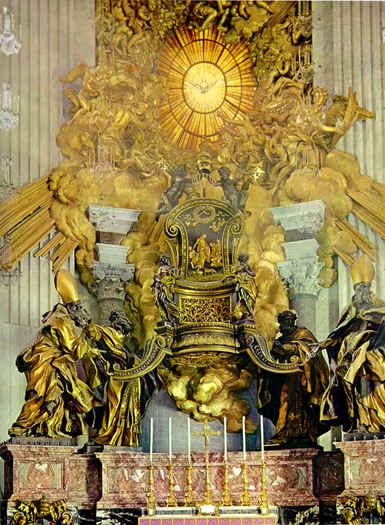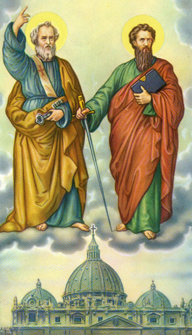

The Archangel Gabriel told the Blessed Virgin Mary, in the Annunciation, that the Son Who was to be born of Her should be a King, and that of His Kingdom there should be no end. Hence, when the Magi were led from the East to the Crib of Jesus, they proclaimed in Jerusalem that they came to seek a King. But his new Empire needed a capital; and whereas the King, Who was to fix His throne in it, was, according to the eternal decrees, to re-ascend into Heaven, it was necessary that the visible character of His Royalty should be left here on earth, and this even to the end of the world. He that should be invested with this visible character of Christ our King would be the Vicar of Christ.
Our Lord Jesus Christ chose Simon for this sublime dignity of being His Vicar. He changed his name into one which signifies the Rock, that is "Peter"; and in giving him this new name, He tells us that the whole Church throughout the world is to rest upon this man as upon a Rock which nothing shall ever move (Matt. 16: 18). But this promise of Our Lord included another; namely, that as Peter was to close his earthly career by the cross, He would give him Successors in whom Peter and his authority should live to the end of time.
But again, there must be some mark or sign of this succession, to designate to the world who the Pontiff is on whom, to the end of the world, the Church is to be built. There are so many Bishops in the Church; in which one of them is Peter continued? This Prince of the Apostles founded and governed several Churches; but only one of these was watered with his blood, and that one was Rome; only one of these is enriched with his Tomb, and that one is Rome; the Bishop of Rome, therefore, is the Successor of Peter, and consequently the Vicar of Christ. It is of the Bishop of Rome alone that it is said: Upon thee will I build My Church; and again: To thee will I give the Keys of the Kingdom of Heaven (Matt. 16: 19); and again: I have prayed for thee, that thy faith fail not; do thou confirm thy brethren (Luke 22: 32); and again: Feed my lambs; feed my sheep (John 21: 15, 17).
Protestantism saw the force of this argument, and therefore strove to throw doubts on St. Peter's having lived and died in Rome. They who labored to establish doubts of this kind rightly hoped that, if they could gain their point, they would destroy the authority of the Roman Pontiff, and even the very notion of a Head of the Church. But History has refuted this puerile objection, and now all learned Protestants agree with Catholics in admitting a fact which is one of the most incontestable, even on the ground of human authority.
It was in order to nullify, by the authority of the Liturgy, this strange pretension of Protestants, that Pope Paul IV, in 1558, restored the ancient Feast of St. Peter's Chair at Rome, and fixed it on the 18th of January. For many centuries the Church had not solemnized the mystery of the Pontificate of the Prince of the Apostles on any distinct feast, but had made the single Feast of February 22nd serve for both the Chair at Antioch and the Chair at Rome. From that time forward, the 22nd of February has been kept for the Chair at Antioch, which was the first occupied by the Apostle.
When St. Peter entered Rome, he came to realize and explain the destinies of this Queen of Cities; he came to promise her an Empire even greater than the one she already possessed. This new Empire is not to be founded by the sword, as was the first. Rome has been hitherto the proud mistress of nations; henceforth she is to be the Mother of the world by Charity; and though all peaceful, yet her Empire shall last to the end of time. Let us listen to St. Leo the Great, describing to us in one of the finest of his Sermons, and in his own magnificent style, the humble yet all-eventful entrance of the Fisherman of Genesareth into the Capital of the Pagan world:
"The good and just and omnipotent God, Who never refused His mercy to the human race, and instructed all men in general in the knowledge of Himself by His super-abundant benefits, took pity, by a more hidden counsel and a deeper love, on the voluntary blindness of them that had gone astray, and on the wickedness which was growing in its proneness to evil; and sent therefore into the world His co-equal and co-eternal Word. The Word being made Flesh did so unite the Divine and human nature, as that the deep abasement of the one was the highest uplifting of the other.
"But that the effect of this unspeakable gift might be diffused throughout the entire world, the providence of God had been preparing the Roman Empire, which had so far extended its limits as to embrace in itself all the nations of the earth. For nothing could be better suited to the divine plan than the confederation of various kingdoms under one and the same Empire; and the preaching of the Gospel to the whole world would the more rapidly be effected by having the several nations united under the government of one common City.
"But this City, ignoring the author of this her promotion, whilst mistress of almost every nation under the sun, was the slave of every nation's errors; and prided herself on having a grand religion, because she had admitted every false doctrine. So that the faster the devil's hold of her, the more admirable her deliverance by Christ.
"For when the twelve Apostles, after receiving by the Holy Ghost the gift of tongues, divided among themselves the world they had to evangelize, the most Blessed Peter, the Prince of the Apostolic Order, was sent to the Capital of the Roman Empire, in order that the light of truth, which had been revealed for the salvation of all nations, might effectively flow from the head itself into the whole body of the world.
"The fact was that there were in this City people belonging to every nation, and the rest of the world soon learnt whatever was taught at Rome. Here, therefore, were to be refuted the opinions of philosophy; here the follies of human wisdom to be exploded; here the worship of devils to be convicted of blasphemy; here the impiety of all the sacrifices to be first abolished; for it was here that an official superstition had systematized into one great whole the fragmentary errors of every other portion of the earth.
"To this City, therefore, O most Blessed Apostle Peter, thou fearest not to come! The companion of thy glory, Paul the Apostle, is not with thee, for he is busy founding other churches; yet thou enterest this forest of wild beasts, and with greater courage than when walking on the waters, thou settest foot on this deep stormy sea! Thou, that didst tremble before a servant-girl in the house of Caiphas, art fearless now before this Rome, this mistress of the world. Is it that the power of Claudius is less than the authority of Pilate, or the cruelty of Nero less than the savageness of the Jews? Not so; but the vehemence of thy love made thee heedless of thy risks; and having come that thou mightest love, thou didst forget to fear. Thou didst imbibe this sentiment of fearless charity on that day when the profession of thy love for thy Master was made perfect by the mystery of His thrice-put question. And what asks He of thee, after thus probing thy heart, but that thou feed the sheep of Him thou lovest with the food whereon thyself had feasted?
"Then, too, there were the miracles thou hadst wrought, the gifts of grace thou hadst received, the proofs of the great works thou hadst achieved; all giving thee fresh courage. Thou hadst taught the truth to such of the children of Israel as had embraced the Faith; thou hadst founded the Church of Antioch, where first began the glorious title of Christian; thou hadst preached the Gospel in Pontus, Galatia, Cappadocia, Asia and Bithynia; and assured of the success of thy work, and of the many years thou hadst yet to live, thou didst bring the trophy of the Cross of Christ into the very walls of Rome, where the counsels of God had already determined that thou shouldst have both the honor of power and the glory of martyrdom." (Sermon on the Feasts of the Apostles Sts. Peter and Paul)

We are in that season of the ecclesiastical year which is devoted to honoring the Incarnation and Birth of the Son of God, and the Maternity of the Blessed Virgin Mary: it behooves us to remember, especially on this present Feast, that it is to the See of St. Peter that we owe the preservation of these dogmas, which are the very basis of our holy religion. Our Holy Mother Church, centered in Rome, not only taught them to us when She sent us the saintly missionaries who evangelized our countries; but, moreover, when heresy attempted to throw its mists and clouds over these high Mysteries, it was Rome that secured the triumph for truth by Her sovereign decisions. At Ephesus, when Nestorius was condemned, and the dogma which he assailed was solemnly proclaimed, that is, that the Divine Nature and the Human Nature which are in Christ make but one Person, and that Mary is consequently the true Mother of God, the Fathers of that General Council thus spoke: "Compelled by the Letters of our Most Holy Father Celestine, Bishop of the Roman Church, we have proceeded, in spite of our tears, to the condemnation of Nestorius." At Chalcedon, where the Church had to proclaim, against Eutyches, the distinction of the two Natures in the Incarnate Word, God and Man, the Fathers, after hearing the Letter of the Roman Pontiff, gave their decision, and said: "Peter has spoken by the mouth of Leo."
Contact us: smr@salvemariaregina.info
Visit also: www.marienfried.com